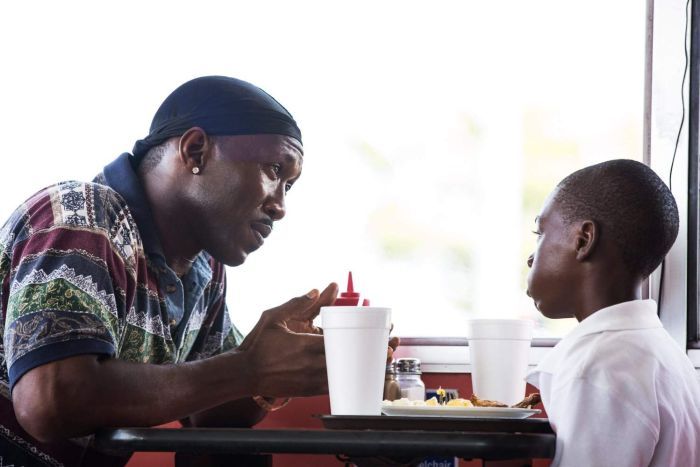Moonlight deserves the Oscar for Best Picture, and here's why
Posted
 Photo:
Mahershala Ali appears in Moonlight's first act alongside the young Chiron, played by Alex R Hibbert. (Supplied: David Bornfriend)
Photo:
Mahershala Ali appears in Moonlight's first act alongside the young Chiron, played by Alex R Hibbert. (Supplied: David Bornfriend)
There's an R'n'B song called Classic Man by Jidenna that plays on a car radio in the film Moonlight.
It's not the original version; it's been slowed down — chopped and screwed is the hip hop term — to make it sound bassier, dreamier. The lyrics play like a tribute to a kind of urban, black dandyism — dressing elegantly, with style — and maybe getting away with a little bit because of it.
It's a small but significant detail, illustrating the film's theme of identity and reinvention
Moonlight tells the story of two men growing up in the 1980s within a few blocks of each other, in a poor black Miami neighbourhood at a time when a tide of cheap cocaine was washing in from Latin America.
It was the beginning of what would come to be called the crack epidemic, with Miami the entry point.
Both the film's writer-director Barry Jenkins and the playwright Tarell Alvin McCraney, on whose play the script is based, lived their early years through it, with single mothers, trying to keep their heads above water. They never met until they came to collaborate on this film.
Moonlight is a semi-autobiographical work for both of them, then.
The protagonist is Chiron, a young gay man struggling to come to terms with his sexuality.
We see him at three separate ages, played by three separate actors, as he grows from a shy boy who's constantly bullied, into an introverted adolescent and finally an imposing figure able to invoke fear in others.
This final incarnation of Chiron is the character who plays Classic Man in the car. A gangster, who wears fake gold teeth — or grills — but remains a vulnerable, insecure person inside. Trevante Rhodes displays an astounding range to play him so subtly.
 Photo:
Trevante Rhodes's Chiron is an imposing figure able to invoke fear in others. (Supplied: David Bornfriend)
Photo:
Trevante Rhodes's Chiron is an imposing figure able to invoke fear in others. (Supplied: David Bornfriend)
As a film, Moonlight's depiction of conflicted masculinity is built on sophisticated contrasts.
A velvety string score accompanies the visuals of ghetto houses and scrappy lawns. The harshness of this world is further softened and interrogated with effects like slow motion and shots of characters who look directly down the lens like they're sharing an intimate thought.
For a film set against the ascendancy of gangsta rap and crack cocaine, there's a quietness to it, and at its centre is a story of yearning and unspoken desire.
Jenkins handles a scene depicting a first kiss on a beach at night with subtlety. You come away remembering images of lips, slightly parted and hands grasping in sand.
A narrative of American decline lurks at the edges of this film, but its radical political message has less to do with documenting that decline and more to do with the tenderness and beauty inside its characters.
In the case of young, poor black men who are so often objectified by the media and cinema alike, it seems a considerable achievement.
Jenkins is aided by a talented cast, including André Holland as the older version of Chiron's friend and Naomie Harris as Chiron's mother.
He deserves Best Director, and Moonlight deserves to beat La La Land — a film also concerned with beauty, but with an ostentation that seems vulgar by comparison — for Best Picture.
Topics: film-movies, arts-and-entertainment, united-states








